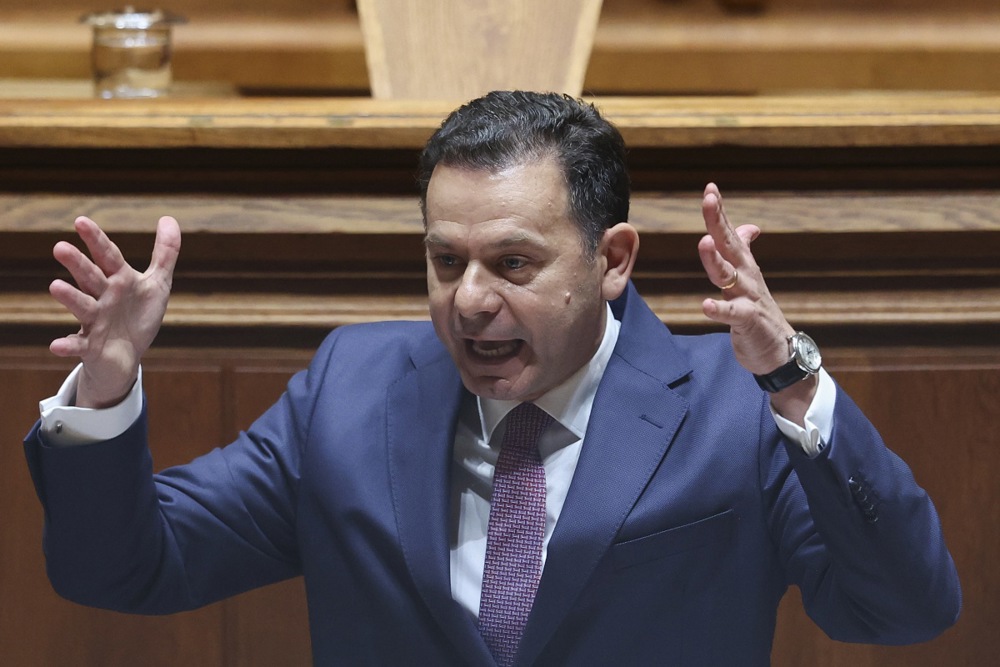Portugal’s right-wing parties have triumphed in the country’s third snap general election in three years.
The governing centre-right Democratic Alliance (AD) led by Prime Minister Luís Montenegro, secured 89 seats in the 230-seat parliament with 32 per cent of the vote.
The Democratic Alliance increased its seats by nine from 80 in the previous election, 14 months before.
Montenegro called the result “a great victory”.
“The people want this Government, and they don’t want another”, he said.
“The people want this Government and this Prime Minister to dialogue with the oppositions. But the people also want the opposition to respect and dialogue with this Government and with this Prime Minister,” Montenegro added.
The AD, though, again fell short of a majority, setting the stage for another minority government.
The election’s biggest loser was the Socialist Party, dropping from 28.7 to 23 per cent of the vote, its worst result in the last 40 years and the party’s third-worst result ever.
In reaction to the beating, Socialist Party president Pedro Nuno Santos resigned.
“I take responsibility, as I have always done. I will therefore ask for internal elections, in which I will not be a candidate,” he said in his speech during election night.
On social media, he added, “I will continue to follow the motto of our founder Mário Soares: only those who give up fighting are defeated. Thank you, see you soon!”
The hard right party Chega proved another winner of the elections.
It outperformed polls and rose from 18 to 22.5 per cent, on par with the Socialists. Both groups now have 58 seats in Parliament.
In six years, Chega has risen from 1.3 per cent support at its inception to become the country’s second-biggest party.
With the victory, André Ventura, Chega’s party president, became the leader of the opposition.
Ventura’s personal campaign was shaken when he fell twice in front of the cameras, but it apparently didn’t shake the voters.
Obrigado Portugal! Obrigado por mais um resultado histórico!?? pic.twitter.com/4OezSQJDT9
— André Ventura (@AndreCVentura) May 19, 2025
“Nothing will be the same as before in Portugal”, Ventura said. “The old guard is truly ending.”
With the polls underestimating his party’s success, Ventura took a swipe at pollsters. “From today, no one will believe in any poll.” he said.
“I warned in time about an injustice that was being committed against more than a million voters.” “It’s time to demand accountability from these companies in Portugal,” he added.
“We really did what no other party had done in Portugal. Today we can officially declare before the entire country with certainty that bipartisanship in Portugal is over,” Ventura emphasised.
Alongside the Socialists, most of Portugal’s other left-wing parties also had a bad election, and combined, Portugal’s Left had a historic weak showing.
The Left Bloc (Bloco de Esquerda), a hard-left party, lost four of its five seats. The CDU, the Portuguese Communists, fell from three seats to one.
Portugal, preliminary final results (excluding voters abroad):
Seat distribution
226/230 seats allocatedAD-EPP: 89 (+9)
PS-S&D: 58 (-20)
CH-PfE: 58 (+8)
IL-RE: 9 (+1)
L-G/EFA: 6 (+2)
CDU-LEFT|G/EFA: 3 (-1)
BE-LEFT: 1 (-4)
PAN-G/EFA: 1
JPP-RE: 1 (new)+/- vs. 2024 election
— Europe Elects (@EuropeElects) May 18, 2025
In policy terms, the elections chiefly centred around housing, public services, safety, and immigration.
Montenegro’s government faced criticism from left-wing parties and media for announcing the expulsion of 18,000 irregular migrants before the election.
Some saw the move as aligning with Chega’s anti-immigration stance, though Montenegro ruled out any coalition with them.
Earlier, the elections were triggered by allegations of conflict of interests tied to Montenegro’s family-owned data protection consultancy, Spinumviva, which have spiralled into a broader political crisis.
Montenegro came into power after then-Socialist prime minister António Costa was forced to resign in November 2023, amid a corruption probe into lithium mining and “green” hydrogen projects.
Costa went on to become President of the European Council last December.
COMMENT: Excluding election-winning populists merely acts as rocket fuel for their poll ratings: This is what Portugal’s Luis Montenegro is about to learn, writes @HenryOlsenEPPC. https://t.co/IXsZgXTgN3
— Brussels Signal (@brusselssignal) April 2, 2024





